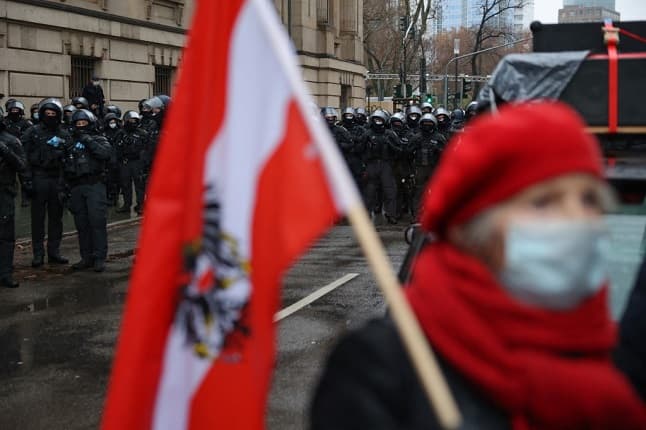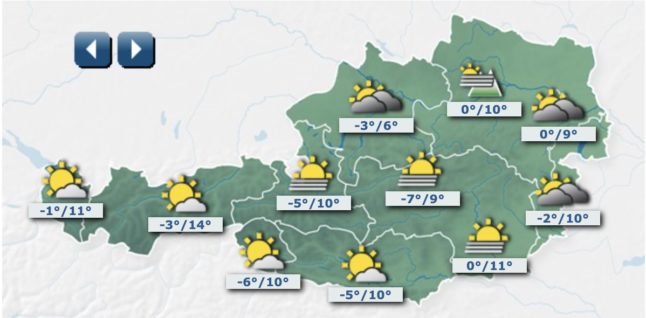Today in Austria: A roundup of the latest news on Thursday

Gas and electricity prices to drop to (slowly) reach consumers, almost all avalanche fatalities last winter were men, discrimination against HIV-positive people and more news from Austria on Thursday.
- Gas and electricity prices drop to (slowly) reach consumers
The wholesale electricity and gas prices have sharply fallen, but so far, end consumers have not benefited from the drop - this is about to change, the newspaper Der Standard reported.
The price drop has yet to be passed on to consumers because energy is not purchased constantly. Instead, contracts are made at once for a whole year, so consumers are still paying for energy that was purchased when prices were high.
Additionally, many Austrian households have contracts with a price guarantee, so direct and immediate price changes are only seen in "floater" contracts - which are riskier, Vienna Chamber of Labour (AK) representative Sandra Matzinger told the newspaper.
How long it will take for bills to go down will depend on each contract and term. However, consumers are advised to make price comparisons and even switch suppliers if possible when beneficial.
READ ALSO: How expensive is it to live in Austria?
- Four things foreigners in Austria need to know about the education system
Every country has its own structure for an education system, and it might be one of the most daunting things for immigrants (especially those with children) to navigate. Here are the basics of Austria's education system.
- Almost all avalanche fatalities last winter were men
In the past winter season, 17 out of 18 avalanche victims in Austria were men, according to data compiled by the Austrian Alpine Association (ÖAV).
"This is not because more men set out on tours in winter, but primarily due to male risk behaviour, which social role models strongly influence. Women, for example, are less likely to succumb to the "illusion of control", the ÖAV told the Austrian media agency APA.
"Women make "more defensive" decisions and "take warnings more seriously," said Michael Larcher, head of the mountain sports department at the Austrian Alpine Association.
Larcher said that men would often be dominated by the worry of "admitting doubts and uncertainty to themselves" in difficult circumstances. This, in turn, increases the willingness to take risks, which are usually responsible for avalanche accidents, because the victims were neither unathletic, inexperienced or poorly equipped, he said.
READ ALSO: Avalanches in Austria: What you should know to stay safe in the mountains
- Austrian government wants to 'reach out' after pandemic
The federal government wants to "reach out" to the population after three years of a divisive Covid-19 pandemic, the broadcaster ORF reported citing statements by Chancellor Karl Nehammer (ÖVP).
"Corona was a kind of trauma for our society, which we should now work through together," Nehammer said. The pandemic and its consequences had left "deep trenches in our society and weighed heavily on people in Austria," the chancellor added.
Together with experts, he said, the approach taken during the pandemic would be analysed, discussed, and, if necessary, mistakes admitted. "We also want to reach out to all those who have no longer felt welcome in the centre of society as a result of the pandemic and its consequences", he said, referring to the people who rejected Covid measures.
READ ALSO: Vienna to drop Covid face mask mandate by end of February
- Criticism of discrimination against HIV-positive people in police
The centre-left party SPÖ (and the Aids Hilfe Wien criticise the discrimination against HIV-positive people in the police force. Anyone who is positive is excluded from the application process for the police service.
The reason given by the Ministry of the Interior for denying access to the police is that any illness requiring long-term medication is a reason for exclusion. "We see this as discrimination," said the managing director of Aids Hilfe Wien, Andrea Brunner, to APA.
"If you are in therapy, there is nothing to stop you from working," Brunner said. A professional ban for HIV-positive people actually only exists for sex work. In the vast majority of cases, you don't have to tell your employer that you are HIV-positive.
READ ALSO: What is Austria’s e-card and what do you need to know about it?
- Weather

Screenshot from ZAMG
If you have any questions about life in Austria, ideas for articles or news tips for The Local, please get in touch with us at [email protected].
Comments
See Also
- Gas and electricity prices drop to (slowly) reach consumers
The wholesale electricity and gas prices have sharply fallen, but so far, end consumers have not benefited from the drop - this is about to change, the newspaper Der Standard reported.
The price drop has yet to be passed on to consumers because energy is not purchased constantly. Instead, contracts are made at once for a whole year, so consumers are still paying for energy that was purchased when prices were high.
Additionally, many Austrian households have contracts with a price guarantee, so direct and immediate price changes are only seen in "floater" contracts - which are riskier, Vienna Chamber of Labour (AK) representative Sandra Matzinger told the newspaper.
How long it will take for bills to go down will depend on each contract and term. However, consumers are advised to make price comparisons and even switch suppliers if possible when beneficial.
READ ALSO: How expensive is it to live in Austria?
- Four things foreigners in Austria need to know about the education system
Every country has its own structure for an education system, and it might be one of the most daunting things for immigrants (especially those with children) to navigate. Here are the basics of Austria's education system.
- Almost all avalanche fatalities last winter were men
In the past winter season, 17 out of 18 avalanche victims in Austria were men, according to data compiled by the Austrian Alpine Association (ÖAV).
"This is not because more men set out on tours in winter, but primarily due to male risk behaviour, which social role models strongly influence. Women, for example, are less likely to succumb to the "illusion of control", the ÖAV told the Austrian media agency APA.
"Women make "more defensive" decisions and "take warnings more seriously," said Michael Larcher, head of the mountain sports department at the Austrian Alpine Association.
Larcher said that men would often be dominated by the worry of "admitting doubts and uncertainty to themselves" in difficult circumstances. This, in turn, increases the willingness to take risks, which are usually responsible for avalanche accidents, because the victims were neither unathletic, inexperienced or poorly equipped, he said.
READ ALSO: Avalanches in Austria: What you should know to stay safe in the mountains
- Austrian government wants to 'reach out' after pandemic
The federal government wants to "reach out" to the population after three years of a divisive Covid-19 pandemic, the broadcaster ORF reported citing statements by Chancellor Karl Nehammer (ÖVP).
"Corona was a kind of trauma for our society, which we should now work through together," Nehammer said. The pandemic and its consequences had left "deep trenches in our society and weighed heavily on people in Austria," the chancellor added.
Together with experts, he said, the approach taken during the pandemic would be analysed, discussed, and, if necessary, mistakes admitted. "We also want to reach out to all those who have no longer felt welcome in the centre of society as a result of the pandemic and its consequences", he said, referring to the people who rejected Covid measures.
READ ALSO: Vienna to drop Covid face mask mandate by end of February
- Criticism of discrimination against HIV-positive people in police
The centre-left party SPÖ (and the Aids Hilfe Wien criticise the discrimination against HIV-positive people in the police force. Anyone who is positive is excluded from the application process for the police service.
The reason given by the Ministry of the Interior for denying access to the police is that any illness requiring long-term medication is a reason for exclusion. "We see this as discrimination," said the managing director of Aids Hilfe Wien, Andrea Brunner, to APA.
"If you are in therapy, there is nothing to stop you from working," Brunner said. A professional ban for HIV-positive people actually only exists for sex work. In the vast majority of cases, you don't have to tell your employer that you are HIV-positive.
READ ALSO: What is Austria’s e-card and what do you need to know about it?
- Weather

If you have any questions about life in Austria, ideas for articles or news tips for The Local, please get in touch with us at [email protected].
Join the conversation in our comments section below. Share your own views and experience and if you have a question or suggestion for our journalists then email us at [email protected].
Please keep comments civil, constructive and on topic – and make sure to read our terms of use before getting involved.
Please log in here to leave a comment.